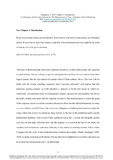- CERES Home
- →
- School of Management (SoM)
- →
- Staff publications (SoM)
- →
- View Item
JavaScript is disabled for your browser. Some features of this site may not work without it.
| dc.contributor.author | Thompson, Toby | |
| dc.date.accessioned | 2020-04-29T15:06:36Z | |
| dc.date.available | 2020-04-29T15:06:36Z | |
| dc.date.issued | 2017-09-13 | |
| dc.identifier.citation | Thompson T (2018) Chapter 1: Introduction. In: Heidegger and Executive Education: The Management of Time, London: Routledge / Taylor and Francis, p. 1-14 | en_UK |
| dc.identifier.isbn | e9781315451855 | |
| dc.identifier.isbn | 9781138211896 | |
| dc.identifier.uri | https://doi.org/10.4324/9781315451855 | |
| dc.identifier.uri | http://dspace.lib.cranfield.ac.uk/handle/1826/15419 | |
| dc.description.abstract | This book is about educating mid-career corporate executives, as dull as that sounds. My argument is aimed at those who are willing to argue for and against the usefulness of every station in the short logical journey that the (pro-education) scholar Stefan Collini outlines, above. The book will do battle with the strange sounding compound term “executive education” and propose that this innocuous seeming practice, as I will introduce it, deserves to be the new means by which we, collectively, can transform some of contemporary society’s greatest ills and iniquities, but not by the hubris usually associated with the corporate executive. This transformation is within the grasp of the corporate executive and the executive educator to affect, but like all transformations, it comes at a cost, which is twofold. Firstly, this cost is our willingness to challenge the dominant scripts, the scripts which tells us how we should act, think and feel in the face of the established orders and the predominant traditions. And on top of that significant outlay lies a second and altogether greater cost, but one that helps offset the first: and this requires us to confront the fact of our death, our anxieties and our boredom in the face of the day-to-day orders we routinely execute. This is where I engage with the work of the twentieth-century German philosopher, Martin Heidegger (1889-1976), using his reckoning on the theme of being and time to enlighten how executive education can be reconceived and practiced anew: cue philosophy. | en_UK |
| dc.language.iso | en | en_UK |
| dc.publisher | Routledge / Taylor and Francis | en_UK |
| dc.rights | Attribution-NonCommercial 4.0 International | |
| dc.rights.uri | http://creativecommons.org/licenses/by-nc/4.0/ | |
| dc.subject | Economics | en_UK |
| dc.subject | Finance | en_UK |
| dc.subject | Business & Industry | en_UK |
| dc.subject | Education | en_UK |
| dc.subject | Humanities | en_UK |
| dc.title | Chapter 1: Introduction | en_UK |
| dc.type | Book chapter | en_UK |
Files in this item
This item appears in the following Collection(s)
-
Staff publications (SoM) [1258]

